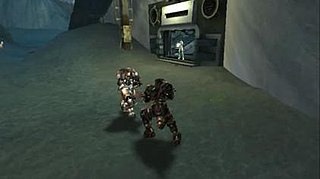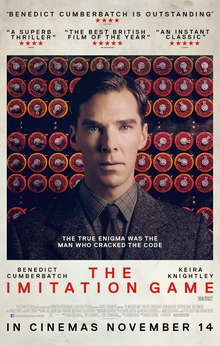
Alan Mathison Turing was an English mathematician, computer scientist, logician, cryptanalyst, philosopher, and theoretical biologist. Turing was highly influential in the development of theoretical computer science, providing a formalisation of the concepts of algorithm and computation with the Turing machine, which can be considered a model of a general-purpose computer. He is widely considered to be the father of theoretical computer science and artificial intelligence.
Alan Turing (1912–1954) was a British mathematician, logician, cryptanalyst and computer scientist.
A codebreaker is a person who performs cryptanalysis.
The Imitation Game is a 2014 film based on a biography of Alan Turing.
A professor is a senior teacher, lecturer and researcher, usually in a college or university.

The Turing Test is a BBC Books original novel written by Paul Leonard and based on the long-running British science fiction television series Doctor Who. It features the Eighth Doctor.
Artificial stupidity is a term used within the field of computer science to refer to a technique of "dumbing down" computer programs in order to deliberately introduce errors in their responses.

The computer game bot Turing test is a variant of the Turing test, where a human judge viewing and interacting with a virtual world must distinguish between other humans and video game bots, both interacting with the same virtual world. This variant was first proposed in 2008 by Associate Professor Philip Hingston of Edith Cowan University, and implemented through a tournament called the 2K BotPrize.
Eugene Goostman is a chatbot that some regard as having passed the Turing test, a test of a computer's ability to communicate indistinguishably from a human. Developed in Saint Petersburg in 2001 by a group of three programmers, the Russian-born Vladimir Veselov, Ukrainian-born Eugene Demchenko, and Russian-born Sergey Ulasen, Goostman is portrayed as a 13-year-old Ukrainian boy—characteristics that are intended to induce forgiveness in those with whom it interacts for its grammatical errors and lack of general knowledge.

The Turing test, originally called the imitation game by Alan Turing in 1950, is a test of a machine's ability to exhibit intelligent behaviour equivalent to, or indistinguishable from, that of a human. Turing proposed that a human evaluator would judge natural language conversations between a human and a machine designed to generate human-like responses. The evaluator would be aware that one of the two partners in conversation was a machine, and all participants would be separated from one another. The conversation would be limited to a text-only channel, such as a computer keyboard and screen, so the result would not depend on the machine's ability to render words as speech. If the evaluator could not reliably tell the machine from the human, the machine would be said to have passed the test. The test results would not depend on the machine's ability to give correct answers to questions, only on how closely its answers resembled those a human would give.
The Alan Turing Year, 2012, marked the celebration of the life and scientific influence of Alan Turing during the centenary of his birth on 23 June 1912. Turing had an important influence on computing, computer science, artificial intelligence, developmental biology, and the mathematical theory of computability and made important contributions to code-breaking during the Second World War. The Alan Turing Centenary Advisory committee (TCAC) was originally set up by Professor Barry Cooper

The Imitation Game is a 2014 American historical drama film directed by Morten Tyldum and written by Graham Moore, based on the 1983 biography Alan Turing: The Enigma by Andrew Hodges. The film's title quotes the name of the game cryptanalyst Alan Turing proposed for answering the question "Can machines think?", in his 1950 seminal paper "Computing Machinery and Intelligence". The film stars Benedict Cumberbatch as Turing, who decrypted German intelligence messages for the British government during World War II. Keira Knightley, Matthew Goode, Rory Kinnear, Charles Dance, and Mark Strong appear in supporting roles.
A Turing machine is an abstract mathematical computational device named after Alan Turing; see the box for variants of this meaning. Turing machine may also refer to:

Turing is the codename for a graphics processing unit (GPU) microarchitecture developed by Nvidia. It is named after the prominent mathematician and computer scientist Alan Turing. The architecture was first introduced in August 2018 at SIGGRAPH 2018 in the workstation-oriented Quadro RTX cards, and one week later at Gamescom in consumer GeForce RTX 20 series graphics cards. Building on the preliminary work of its HPC-exclusive predecessor, the Turing architecture introduces the first consumer products capable of real-time ray tracing, a longstanding goal of the computer graphics industry. Key elements include dedicated artificial intelligence processors and dedicated ray tracing processors. Turing leverages DXR, OptiX, and Vulkan for access to ray-tracing. In February 2019, Nvidia released the GeForce 16 series of GPUs, which utilizes the new Turing design but lacks the RT and Tensor cores.

Turochamp is a chess program developed by Alan Turing and David Champernowne in 1948. It was created as part of research by the pair into computer science and machine learning. Turochamp is capable of playing an entire chess game against a human player at a low level of play by calculating all potential moves and all potential player moves in response, as well as some further moves it deems considerable. It then assigns point values to each game state, and selects the move resulting in the highest point value.

Alan Turing was an English mathematician, computer scientist, logician, cryptanalyst, philosopher, and theoretical biologist. He left an extensive legacy in mathematics, science, society and popular culture.
This page is based on this
Wikipedia article Text is available under the
CC BY-SA 4.0 license; additional terms may apply.
Images, videos and audio are available under their respective licenses.





